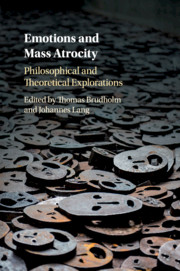Book contents
- Emotions and Mass Atrocity
- Emotions and Mass Atrocity
- Copyright page
- Contents
- Contributors
- Acknowledgments
- 1 Introduction: Emotions and Mass Atrocity
- Part I Causes and Dynamics
- Part II Emotional Responses
- 7 “Destroy Your Sight with a New Gorgon”: Mass Atrocity and the Phenomenology of Horror
- 8 Perpetrator Disgust: A Morally Destructive Emotion
- 9 Unraveling the Meaning of Survivor Shame
- 10 Beyond Empathy and Compassion: Genocide and the Emotional Complexities of Humanitarian Politics
- Part III Repair and Commemoration
- References
- Index
8 - Perpetrator Disgust: A Morally Destructive Emotion
from Part II - Emotional Responses
Published online by Cambridge University Press: 16 March 2018
- Emotions and Mass Atrocity
- Emotions and Mass Atrocity
- Copyright page
- Contents
- Contributors
- Acknowledgments
- 1 Introduction: Emotions and Mass Atrocity
- Part I Causes and Dynamics
- Part II Emotional Responses
- 7 “Destroy Your Sight with a New Gorgon”: Mass Atrocity and the Phenomenology of Horror
- 8 Perpetrator Disgust: A Morally Destructive Emotion
- 9 Unraveling the Meaning of Survivor Shame
- 10 Beyond Empathy and Compassion: Genocide and the Emotional Complexities of Humanitarian Politics
- Part III Repair and Commemoration
- References
- Index
Summary
- Type
- Chapter
- Information
- Emotions and Mass AtrocityPhilosophical and Theoretical Explorations, pp. 142 - 161Publisher: Cambridge University PressPrint publication year: 2018
- 2
- Cited by



